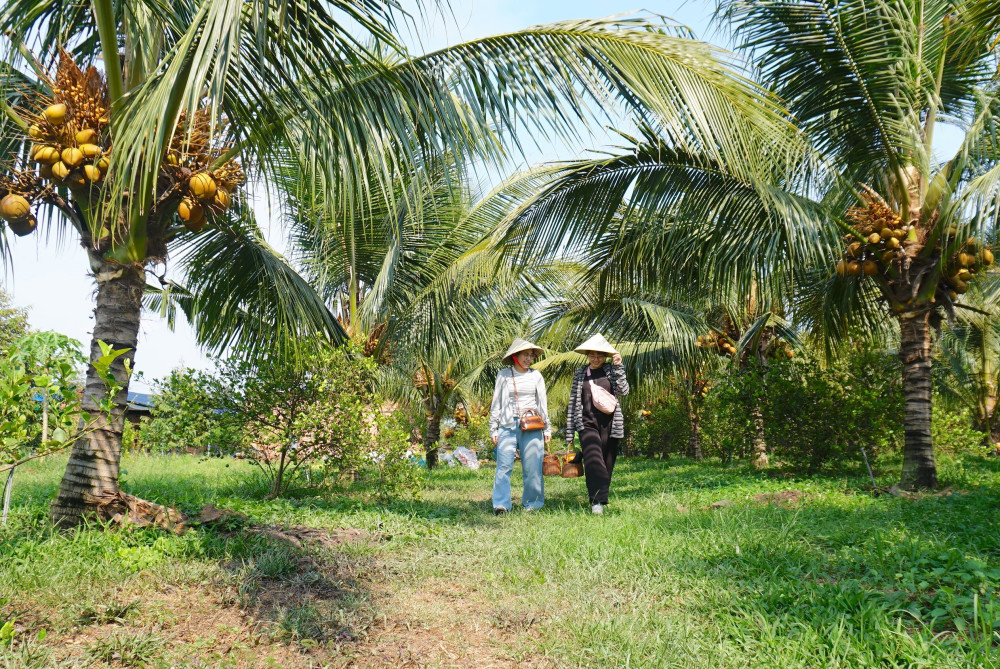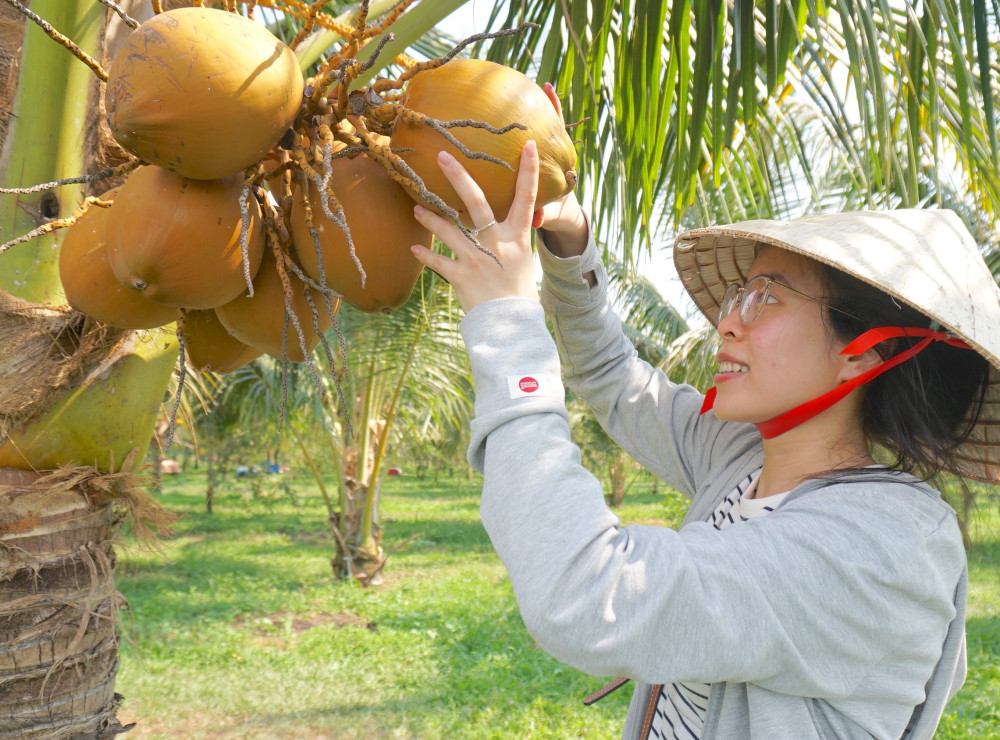Organic coconut - "sweet fruit" on the sunny land
Tay Ninh was once known as the "capital of custard apples", but recently, thanks to innovative thinking and the application of modern techniques, many people have converted their crop structure to the organic coconut model. This is considered an effective economic model and an attractive destination for tourists.
New direction for agriculture
Thanh Tan commune (now Binh Minh ward), was once known as the "capital of custard apples" of Tay Ninh. However, in recent years, the increase in diseases on custard apple trees, along with unstable prices, has affected many gardeners. Many households have boldly switched to other crops. Among them, the model of growing coconuts intercropped with strawberries in the Japanese style, combined with the development of ecotourism by Mr. Nguyen Thanh Vu is considered a green, sustainable direction, bringing double efficiency.

Mr. Nguyen Thanh Vu's coconut garden is grown organically
Mr. Vu said that before he "fell in love" with agriculture, he had worked for many years in the field of fertilizer and agricultural materials production at a Japanese-Vietnamese joint venture company. "The working environment there gave me the opportunity to interact and learn a lot from Japanese agricultural practices," Mr. Vu shared.
From his accumulated experience, Mr. Vu realized that coconut trees are easy to grow and adapt well to many types of soil such as sandy loam, loam or clay. In particular, coconuts bear fruit all year round, making them very suitable for combining with ecotourism development. Taking advantage of this, he decided to invest in organic coconut farming combined with tourism and initially reaped encouraging successes.
According to Mr. Vu, Tay Ninh has the advantage of abundant agricultural waste and by-products such as sugarcane and cassava residue - organic materials that are very good for soil improvement. “Our land has a lot of sunshine, so the coconut water can be very sweet. If the soil is well improved, the productivity and quality can be comparable to the coconuts in the West.” Mr. Vu affirmed.
Mr. Vu started with soil improvement. Before setting up the garden, he collected sugarcane and cassava residues, composted them into piles and added microorganisms to speed up the decomposition process. After about 6 months, when the compost had decomposed, he plowed the soil, mixed it well, and added micronutrients such as fused phosphate to improve the pH and increase the mineral content of the soil.
Although it has good drought resistance, during the growth stage, coconuts still need to be provided with enough water. Mr. Vu has invested in an irrigation system combined with automatic fertilizer injection, both maintaining humidity and providing stable nutrients, especially useful in the dry season. At the same time, he also created an ecological environment for the soil rich in worms by retaining the natural grass layer, only cutting around the base; the rest is cut and composted, becoming a long-term organic source for the garden.
Mr. Vu also focuses on pest control in the direction of biological safety. According to him, the coconut tree is most afraid of weevils that damage the top, so he chose a hybrid Siamese coconut variety with a hard trunk, limiting this type of insect. In addition, he also applies the measure of sprinkling salt around the top or hanging salt bags on the top to prevent disease; using biological drugs in granular form to sprinkle around the base to kill nematodes; combining nano-microorganisms with molasses to both improve the soil and control fungal diseases.
"Currently, my coconut products are consumed in many forms: fresh, exported, processed, etc. Thanks to the synchronous application of technical solutions, the coconut garden produces very high quality fruit. The market requires a minimum sweetness of 7 Brix degrees for coconuts, and my coconuts always reach above 9 degrees, so they are favored by many consumers" - Mr. Vu said.
Green tourism in the "sunny land"
In recent years, Tay Ninh tourism has gradually affirmed its position, attracting a large number of domestic and foreign tourists. With the highlight being the Ba Den Mountain National Tourist Area, the province is coordinating with relevant units to develop many tourism models associated with agriculture. This direction initially shows positive results, meeting the increasing needs of tourists.
Mr. Nguyen Thanh Vu's organic coconut garden has become an ideal destination for tourists to Tay Ninh. Since the garden began to harvest, many groups of visitors from inside and outside the province have come to visit and enjoy the fresh, clean space; learn about the organic gardening process, pick and enjoy coconuts and bring them home as sourvenir.

The sweetness of coconuts is always above 9 Brix degrees
“I choose to grow organic coconuts not only because of the economic efficiency but also because I want to create a sustainable agricultural model associated with ecotourism. By taking advantage of the climate and available organic resources of Tay Ninh and applying modern farming techniques, I believe that organic coconuts can bring stable income, protect the land, preserve the environment, and at the same time introduce to tourists an image of a green, clean countryside worth experiencing” - Mr. Vu emphasized.
Evaluating this model, Mr. Ha Thanh Tung - Deputy Director of the Provincial Agricultural Extension Center, said that Tay Ninh has many strengths in tourism, of which agricultural tourism is a potential model but has not been properly exploited. The fact that gardeners boldly develop agriculture combined with tourism has opened up a new space for the local agricultural sector.
“We are actively supporting businesses to create products that attract tourists. Mr. Vu's organic coconut garden is a new, suitable and effective tourism product, promising to become a highlight for Tay Ninh tourism in the coming time” - Mr. Ha Thanh Tung shared.
According to Mr. Ngo Tran Ngoc Quoc - Chairman of Tay Ninh Tourism Association, with its existing advantages, the province is gradually forming many tourism models associated with agriculture and initially showing clear prospects. Currently, around the Ba Den mountain area, many agricultural tourism spots have appeared, built by farmers themselves, from high-tech agricultural models to garden tourism.
“We need to create a difference for Tay Ninh tourism with unique products. In the coming time, the Association will build a symbiotic ecosystem, connecting all members in the tourism sector to cooperate, create community strength, and aim to develop green tourism, thereby creating a breakthrough for the province's tourism industry" - Mr. Ngo Tran Ngoc Quoc emphasized.
From many years of experience working with Japanese partners and understanding the natural advantages of his homeland, Mr. Nguyen Thanh Vu's rows of straight organic coconut trees are the living proof of modern agricultural thinking. Not only does it produce sweet fruits that meet export standards, but his model also opens up a direction for developing green agriculture associated with ecotourism—a bright spot that helps Tay Ninh effectively exploit the potential in the border area./.
By Hoang Yen - Translated by Q. Thien
Source: https://baolongan.vn/phat-trien-vung-trong-dua-huu-co-tai-tay-ninh-dua-huu-co-trai-ngot-tren-vung-dat-nang-bai-1--a202218.html
 Digital promotions reshape Vietnam’s e-commerce race
Digital promotions reshape Vietnam’s e-commerce race




